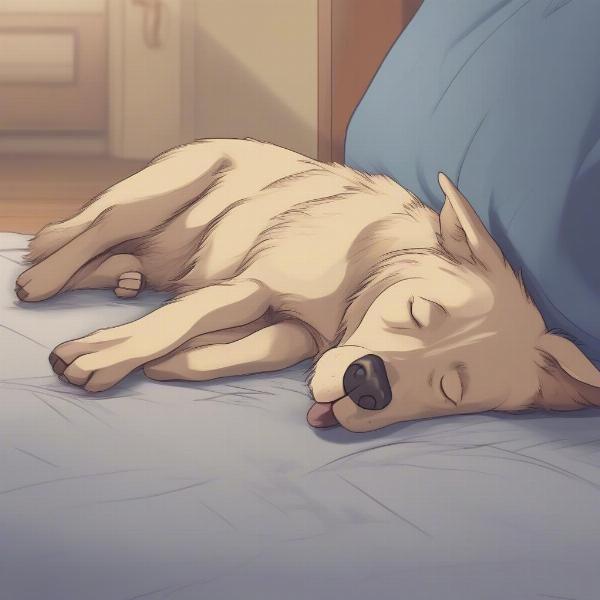Understanding why your dog howls in his sleep can be puzzling. Is it a sign of distress, a bad dream, or something else entirely? This article will delve into the various reasons behind canine sleep-howling, helping you decipher your furry friend’s nocturnal vocalizations.
Decoding Doggy Dreams: Why the Night Howls?
Dogs, like humans, experience different sleep stages, including REM (Rapid Eye Movement) sleep. This is the stage associated with dreaming. During REM sleep, your dog’s muscles are typically relaxed, preventing them from acting out their dreams. However, vocalizations, like whimpering, barking, and howling, can still occur. So, if your dog is howling in his sleep, he might be reacting to a dream, perhaps chasing a squirrel or playing with a beloved toy.
Beyond Dreams: Other Reasons for Sleep Howling
While dreaming is a common cause, other factors can contribute to sleep howling:
- Breed Predisposition: Some breeds, particularly those known for their vocalizations like Huskies and Beagles, are more prone to howling, even during sleep. This is often linked to their ancestral roles and communication methods.
- Environmental Noises: If there are unusual sounds outside, like sirens or other animals, your dog might howl in response, even while asleep. Their heightened senses can pick up these noises and trigger a reaction.
- Underlying Medical Conditions: Although less common, certain medical conditions, such as pain or cognitive dysfunction, could lead to unusual vocalizations during sleep. If you notice a sudden change in your dog’s sleep behavior, consult your veterinarian.
 Dog undergoing a long sleep howling session
Dog undergoing a long sleep howling session
Is My Dog’s Sleep Howling a Problem?
In most cases, occasional sleep howling is perfectly normal and nothing to worry about. However, if the howling is frequent, prolonged, or accompanied by other behavioral changes, it’s worth investigating further.
When to Consult a Vet
- Sudden onset of howling: If your dog wasn’t a sleep howler before and suddenly starts, it warrants a check-up.
- Excessive howling: Frequent and prolonged howling could indicate a problem.
- Other symptoms: Look out for changes in appetite, energy levels, or other unusual behaviors.
Creating a Peaceful Sleep Environment for Your Dog
A comfortable and quiet sleeping area can help minimize sleep disruptions and potential howling. Ensure your dog has a cozy bed, a consistent sleep schedule, and a quiet environment free from excessive noise and distractions.
Conclusion
Understanding why your dog howls in his sleep involves considering various factors, from dreams to breed and even potential health concerns. By observing your dog’s behavior and consulting with your vet when necessary, you can ensure your furry friend enjoys peaceful slumbers and decode those mysterious nighttime howls.
FAQ
-
Q: Is it normal for my dog to howl in his sleep? A: Yes, occasional sleep howling is often normal, especially during REM sleep when dogs dream.
-
Q: Should I wake my dog if he’s howling in his sleep? A: Generally, it’s best not to disturb your dog unless the howling seems distressed or is accompanied by other concerning symptoms.
-
Q: Can I prevent my dog from howling in his sleep? A: While you can’t completely prevent it, creating a calm and comfortable sleep environment can help minimize sleep disruptions.
-
Q: What breeds are more prone to sleep howling? A: Vocal breeds like Huskies, Beagles, and hounds are generally more prone to howling, even during sleep.
-
Q: When should I be concerned about my dog’s sleep howling? A: Consult a vet if the howling is sudden, excessive, prolonged, or accompanied by other behavioral changes.
-
Q: Could my dog’s sleep howling be a sign of pain? A: While less common, pain or discomfort could be a factor. Consult your vet to rule out any underlying medical conditions.
-
Q: Does my dog have nightmares when they howl in their sleep? A: We can’t know for sure what dogs dream, but howling could be a reaction to a dream, whether pleasant or unpleasant.
Related Articles on ILM Dog
About ILM Dog
ILM Dog is your trusted international resource for expert dog care advice. From breed selection and health guidance to training tips and product recommendations, we cover all aspects of dog ownership. We provide expert insights into dog breeds, health, training, nutrition, grooming, and more. Contact us for personalized support at [email protected] or +44 20-3965-8624.